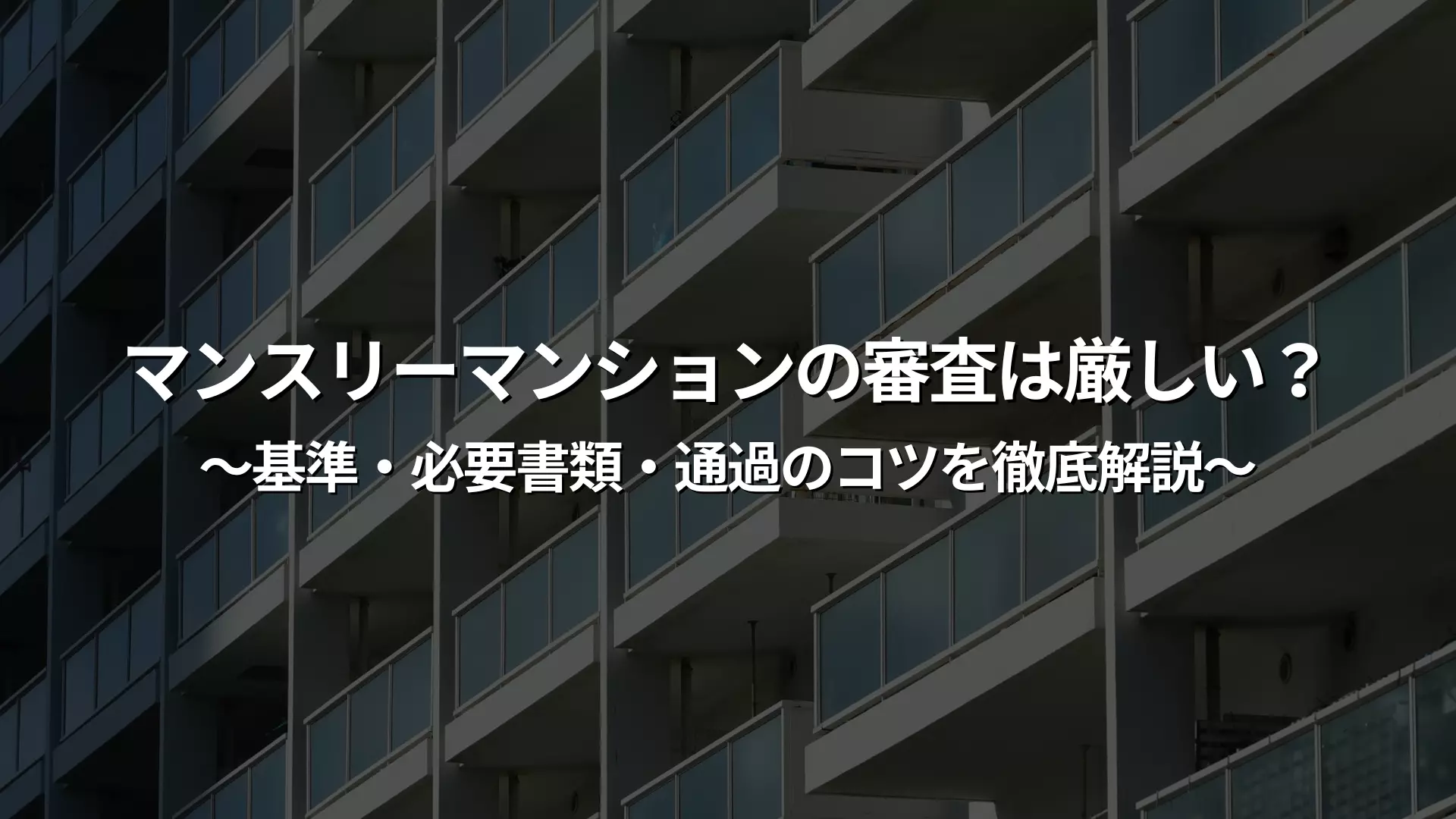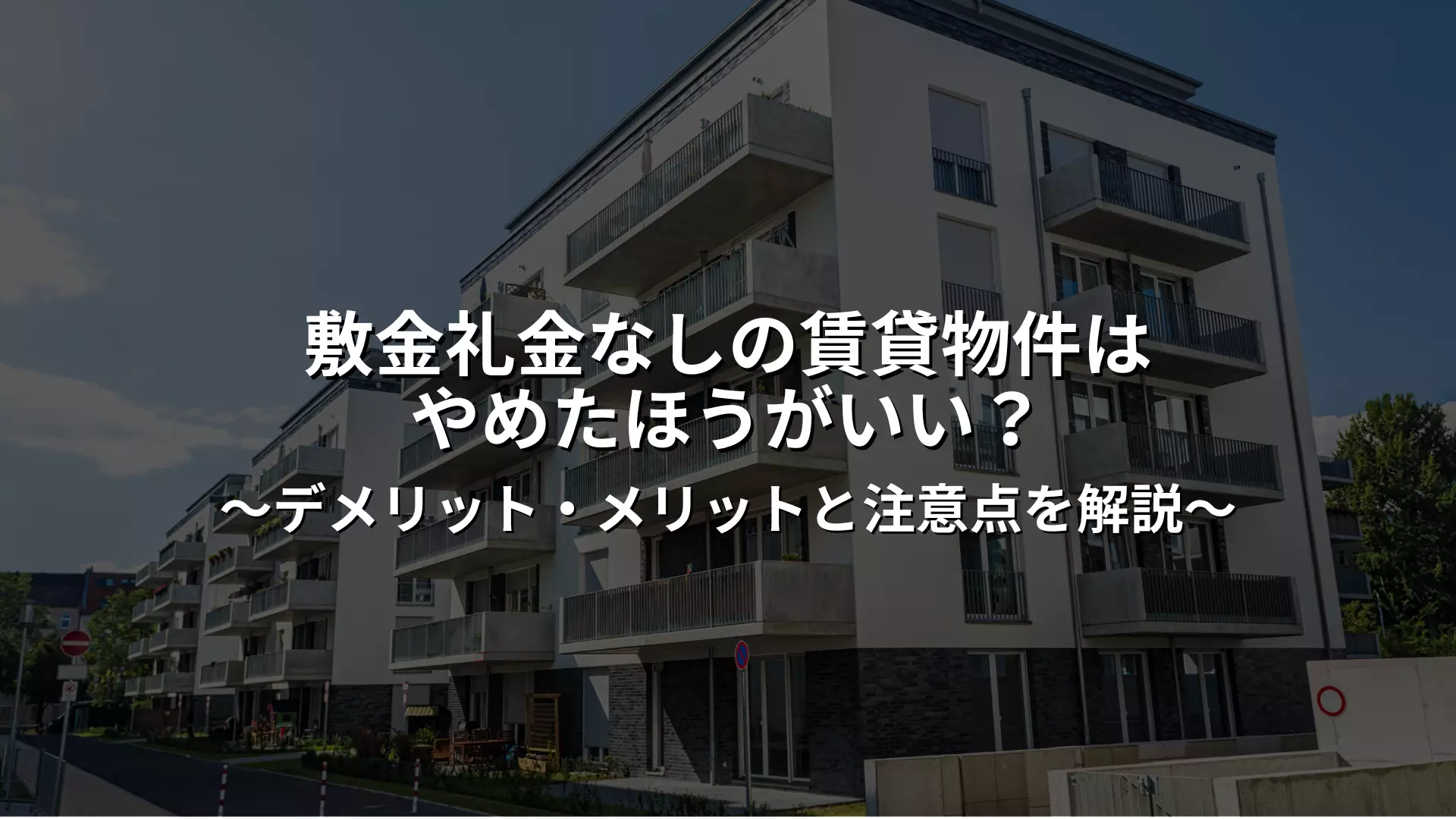What is a monthly apartment? | Differences from regular rental properties
A monthly apartment is a short-term rental property that can be contracted on a monthly basis. Unlike regular rentals, no deposit or key money is required, and properties generally come with furniture and appliances. They are popular as temporary housing for those transferring or moving away from home, for those renovating, or as a place to stay before starting work or entering school. The contract period is set, and in many cases "fixed-term rental contracts" and "advance payment systems" are used, offering flexibility and immediacy that differs from regular rentals.
Below, we will explain in detail the characteristics of monthly apartments and how the contract works.
Characteristics of monthly apartments and contract types
The biggest feature of monthly apartments is their convenience: they come fully furnished, have all the utilities included, and you can move in on the same day. Unlike regular rental properties, they come equipped with basic amenities such as a TV, refrigerator, washing machine, and microwave, so you can start living there with just a suitcase.
In addition, in many cases no security deposit, key money, or brokerage fees are required, making it popular with those who want to keep initial costs down. The contract period is generally short-term, at least one month, and both corporate and individual contracts can be accommodated.
The procedures for moving in and out are simple, and contracts can be completed more quickly than with regular rental properties, which is one of the reasons why it is popular with busy businessmen and short-term residents.
About "fixed-term rental contracts" and "advance payment systems" that are different from regular rentals
Monthly apartments often use a "fixed-term lease contract" and "advance payment system," which is significantly different from a typical ordinary lease contract.
- A fixed-term lease is a contract in which the term is specified at the time of signing, and the contract automatically ends when the term ends. There is no assumption of renewal, and in principle, a new contract is required after the contract expires.
- The prepayment system involves paying one or several months' worth of usage fees in one lump sum up front. This simplifies credit checks, but in some cases no refunds will be given if you cancel midway through the contract.
This allows both the property owner and the user to use the property for a short period of time with clear accounting. By understanding this contract system, which differs from regular rentals, you can make the most of monthly apartments more smoothly.
Is there an inspection process for monthly apartments?
"Are there screening procedures for monthly apartments?" is a question that first-time users are very concerned about. In conclusion, most monthly apartments do have screening procedures. However, the procedures are generally simpler than regular rental contracts and the process is quick. In particular, for properties that are intended for short-term stays or prepayment, there are many cases where proof of income or a guarantor is not required, making them popular with a wide range of people.
Here, we will take a closer look at whether or not monthly apartments require screening and what their characteristics are.
Basically, there is screening process | Reasons and background
When signing a contract for a monthly apartment, there is generally an examination process.
This is because the property provider needs to know the identity of the tenant and whether or not they have the ability to repay in order to avoid any problems, even if the contract is short-term.
in particular,
- Submit your identity document
- Simple confirmation of purpose of use
- The review will be conducted based on whether or not you have made advance payment of the usage fee.
Unlike regular rentals, you are rarely asked for information about your place of employment, proof of annual income, or a guarantor, but it is essential to screen the applicant from the perspective of "whether their identity can be confirmed and whether they are a problem-free user." In particular, for long-term rentals or high-priced properties, more detailed information may be required, so it is important to check in advance.
The reason why screening is said to be "lenient" compared to regular rental properties
One of the reasons why monthly apartments are said to have "less stringent screening" than regular rental properties is the contract type and payment method.
Monthly apartments are generally based on fixed-term leases and lump-sum prepayments, making it easier for landlords to reduce the risk of non-payment. As a result, in many cases, you do not need to submit proof of income or employment information, making them easy to use for people in a variety of positions, including the unemployed, students, and freelancers.
In addition, there are many properties that do not require a guarantor, and the screening process tends to take a relatively short time. For these reasons, many people feel that it is "easier to rent than a regular rental property" and that the hurdles are low. However, basic checks such as submitting identification and contact information are required, so it is essential to make minimum preparations.
Search for a room
Only furnished properties with appliances are listed!
Main criteria and points for tenant screening
When signing a contract for a monthly apartment, you will need to go through a certain level of screening, just like with a regular rental property. However, due to the unique contract format and prepayment system of monthly apartments, the screening process is relatively simple. However, there are still some minimum checks to prevent any issues, and the main screening items are things like verifying your identity and ability to pay.
In this chapter, we will explain in detail the specific points that are checked during the rental application process, the necessary documents, and points to note regarding occupation, age, and nationality.
Submission of identification documents and ID is required
The most basic requirement for screening applicants for monthly apartments is the submission of identification documents. This is an essential procedure to prevent any problems and ensure the legal integrity of the contract.
in particular,
- driver's license
- passport
- My Number Card, etc.
You will be required to show official photo identification.
In the case of corporate contracts, a copy of the real estate registry or an employee ID card may be required. Also, if your ID and current address are different, you may be asked to submit additional documents that prove your current address, such as a resident registration card or utility bill. Since submitting identification documents is required for almost all properties, it is a good idea to check the expiration date and address notation in advance.
Proof of income is often not required, but ability to pay is important
When screening for monthly apartments, you are often not required to submit proof of income, unlike regular rental properties. This is because it is common for rent to be paid in advance at the time of signing the contract, which reduces the risk of non-payment. Therefore, even part-time workers, freelancers, and unemployed people may pass the screening.
However, the ability to pay itself is not excluded from the screening, but rather the emphasis is on whether or not you can pay the rent for the contract period in advance. If there are concerns about delayed payment or being unable to contact the applicant, the screening may not pass. Therefore, it is important to clearly prepare the expected payment date and payment method so that the process can be handled smoothly even if you do not have proof of income.
Are occupation, age, and nationality checked?
When screening applicants for monthly apartments, they may ask about your occupation, age, and nationality, but this is not necessarily a direct reason for your rejection.
- Occupation: You do not necessarily have to be a full-time employee, there are many properties available for freelancers and students.
- Age restrictions: In principle, this is widely accepted, although there may be special verification requirements for the elderly and minors.
- Foreign nationality: In most cases, you can sign a contract by presenting your residence card or passport, confirming your emergency contact information, etc.
However, some properties may have restrictions on use by foreign nationals or minors, so it is important to check in advance. Choosing a property that offers flexible accommodation is also a shortcut to passing the screening.
Can unemployed people or students live in monthly apartments?
Even if you are worried about not having an income or working part-time, monthly apartments have a relatively low barrier to entry, and in many cases you can move in. Unlike regular rentals, the screening process focuses on your ability to repay and your purpose for using the property, so you don't have to be a full-time employee. Furthermore, in many cases you can sign a contract under the name of a parent or acquaintance, making it a flexible option for students and the unemployed.
Here we will explain the key points that are looked at during the screening process and some specific tips to pass.
The screening process looks at "ability to repay" and "purpose of use"
When screening for monthly apartments, emphasis is placed on whether the applicant can pay the fees for the contract period and whether the apartment will be used for appropriate purposes, rather than on occupation or annual income. In particular, since fees are often paid in advance, even those with an unstable income are less likely to be considered problematic if they can pay in one lump sum.
The purpose of use is also one of the points to be confirmed, and a clear reason such as "for job hunting," "temporary housing before entering university," "renovating the house," etc. will increase credibility. On the other hand, if the purpose of use is unclear or there is no consistency in the explanation for long-term stay, it may be viewed with suspicion.
Regardless of your occupation or status, the key to passing the screening is to clearly state your purpose for use and your payment plan.
In some cases, it is possible to make a contract under the name of a parent or acquaintance.
If it is difficult for unemployed people or underage students to sign a contract for a monthly apartment in their own name, they may be allowed to sign a contract in the name of a parent or acquaintance.
It is common to proceed with the contract in the name of a relative, especially when there is a clear reason, such as right after graduating from high school, before entering university, or while job hunting. In this case, the parent or guardian will be the person who signs the contract and pays, and the person will use the property as the tenant. Depending on the property, you may be required to submit a power of attorney or a consent form, so be sure to check the necessary documents in advance.
In addition, a friend or colleague may act as the agent, but since they will be held responsible in the event of any trouble, it is essential that the contract is made with someone you have a trusting relationship with.
Tips for students and part-time workers to pass
For students and part-time workers, it is important to keep a few points in mind in order to pass the screening for a monthly apartment.
- First, prepare your identification documents early and make sure your address and other details are correct.
- Next, it is also effective to clearly communicate the purpose of use. If you have a specific reason, such as "temporary stay for university enrollment" or "accommodation during an internship," the landlord will feel more comfortable renting out the property.
- Regarding payment methods, you can increase your chances of being approved if you can show that you can pay in advance. It is also recommended to choose a property that allows the use of credit cards and guarantor companies.
If you are unsure, choosing a property with looser screening standards or a property run by a corporation from the start will increase your chances of signing a contract smoothly.
Search for a room
Only furnished properties with appliances are listed!
What are the cases in which you may fail the rental application?
It is said that the screening process for monthly apartments is more lenient than for regular rental properties, but it does not mean that 100% of applicants pass, and there are cases where applicants fail the screening. In particular, this is often due to the grade or price setting of the property they choose, or contract terms that do not suit their own circumstances, so it is important to check and prepare in advance. Also, do not overlook restrictions due to attributes such as incomplete documentation, delayed communication, and minors and foreign nationals.
Here we will explain in detail the specific patterns that are likely to cause you to fail the screening process.

Cases where a high-grade property was chosen
Among monthly apartments, there are high-grade properties that are recently built, close to stations, and fully equipped, but the rent for these tends to be set higher and the screening criteria tend to be somewhat stricter. In particular, unemployed people, part-time workers, and students are likely to be judged as having weak proof of their ability to repay, and may fail the screening due to issues such as "whether a long-term stay is really possible" and "whether the fee can be paid in advance."
In addition, if you apply as an individual for a property that is based on a corporate contract, you may be deemed ineligible. If you are looking for a high-grade property, the key to passing the screening is to clearly present a payment plan and, if necessary, consider using a parent's name or a guarantor.
Examples of refusal due to payment problems or insufficient documents
The most common reasons for failing the screening process are "late payment" and "insufficient required documents."
Many monthly apartments require you to pay in advance when signing a contract, and if the full amount is not paid by the specified date, your application may be automatically canceled. Also, if there are any deficiencies in your identification documents or supporting documents, the contract itself may not be concluded.
for example,
- The address on your driver's license does not match the address on your application
- Your residence card has expired, etc.
Small mistakes like this can lead to big trouble. To avoid these kinds of mistakes, it is important to check the document checklist before applying and stick to the payment schedule.
The screening process can be difficult for those with foreign nationality, minors, or those without a guarantor.
If you are a foreign national, a minor, or have no guarantor, you may have difficulty passing the screening process for a monthly apartment. Foreign nationals may be considered to have concerns about their ability to communicate in Japanese or respond in an emergency, and may be refused entry into some properties.
Required documents include:
- Residence card
- passport
- Emergency contact information
The above items are required, so if you are not prepared, there is a high chance that you will not pass the screening. In addition, since minors have restrictions on the act of signing a contract, a parental consent form or a contract in a parent's name may be required. Furthermore, although the number of properties that do not require a guarantor is increasing, some properties require the submission of a guarantor or emergency contact information. If you cannot meet these requirements, it may be difficult to sign a contract for some properties, so it is essential to check in advance.
Things to keep in mind to pass the examination
Although the screening process for monthly apartments is relatively easy, it doesn't mean that anyone can pass it. In particular, if you are unemployed or a student, there are a few "points to pay attention to" in order to pass the screening smoothly. Even neglecting basic things such as preparing the necessary documents, understanding the payment schedule, and responding promptly to communications can affect the screening process.
Here, we will introduce some important points that you should check and do in advance to successfully pass the screening for a monthly apartment.
Check payment method and due date | The importance of prepayment
In most cases, monthly apartment contracts require you to pay in advance. This means that you must pay the rent for the entire contract period in one lump sum immediately after applying. For this reason, if you delay payment after passing the screening process, your contract may be invalidated or the property may be taken by another applicant.
Also, payment methods vary depending on the property, such as "bank transfer only" or "credit card accepted," so it is important to check before applying. In particular, the speed of payment after receiving contact is considered an indicator of the landlord's trustworthiness, so it is best to respond as quickly as possible. Showing in advance that you have the funds ready may also work in your favor during the screening process.
Flexibility in communication and desired conditions determines success rate
In the screening process for monthly apartments, not only documents and ability to pay are important factors, but also "smoothness of communication" and "flexibility to meet desired conditions." After applying, the operating company or management company may contact you by phone or email to confirm, and you can increase their credibility by responding promptly and courteously.
On the other hand, if you give the impression that you are difficult to contact or that you respond slowly, you may be perceived as a company that is likely to experience problems even after signing a contract, which may result in your application being rejected.
Also, if you are too strict with your desired conditions, such as "non-smoking rooms only" or "high floors preferred", the number of properties you can apply for will be limited, reducing your chances of passing the screening. By being somewhat flexible with your conditions and responding sincerely, you will increase your chances of passing the screening.
Search for a room
Only furnished properties with appliances are listed!
What are the options for long-term stay without screening?
For those who are not confident about passing the screening process or who are unemployed or of foreign nationality but want to stay long-term, it is important to know about options other than monthly apartments. In fact, properties such as monthly hotel-style accommodation, simple lodgings, and shared houses often do not require screening or have a very simple screening process, and in some cases you can sign a contract just by presenting identification. Each of these facilities has its own characteristics, and the costs and living environment vary, so it is important to choose a style that suits you.
Here we will explain in detail alternative options for long-term stays that do not require screening, as well as key points to consider when searching for a property.
Differences from monthly hotel-style rentals and simple lodgings
One of the most common options for long-term stays without screening is "monthly hotels" and "simple lodgings." Because these are classified as accommodation businesses, unlike rental contracts, in many cases you can move in just by presenting identification, and screening is either not required or is very lenient.
- Hotel-style monthly rentals include cleaning services, front desk services, and other amenities, and the living infrastructure is in place, so you can enjoy a comfortable stay.
- Simple lodgings are ideal for a cost-effective stay, with dormitory-style accommodation and shared bathroom facilities.
However, since neither of these properties are intended for residential use, there are some disadvantages, such as not being able to register your residence there, and restrictions on noise and privacy. If you are considering a long-term stay, make sure to check carefully whether the property is suitable for use as a "living base."
How to find properties with easy screening and points to note
If you want to choose a monthly rental property with as lenient screening as possible, it is important to narrow down your search. First, prioritize properties that clearly state that they require prepayment, no guarantor, and can be contracted with only identification documents. Monthly apartments operated by corporations and properties for business use often have simplified screening and are handled quickly.
In addition, in some cases, you can expect flexible responses in properties operated by local real estate companies. However, the more "lenient the screening" of a property, the more likely it is that problems will occur if you do not follow the minimum rules, so it is essential to check the contract contents and cancellation policy. The cheaper the property or the more relaxed the conditions, the more you should carefully read the terms of use before signing the contract.
Shared houses are an option, but there is an examination process.
Although they do not require a complete screening process, "share houses" are also gaining attention as a relatively flexible option. Like monthly apartments, many share houses come with furniture and appliances, and utilities are included, and the rent is low, making them suitable for long-term stays. Although there is a screening process, in many cases it only requires submitting documents and having an interview, so it is relatively easy for unemployed people, students, and foreign nationals to be accepted.
Another benefit is that you can build new relationships by living with multiple people. However, you will need to follow certain rules regarding noise levels and how to use the shared spaces, so it is important to check the management policy in advance.
In many cases, the initial costs are small, so it is worth considering as a realistic option for those who are worried about the screening process.
summary
Compared to regular rentals, the screening process for monthly apartments is simpler, making them a flexible housing option that is easy for unemployed people and students to use. As long as you follow the minimum rules, such as submitting identification documents and paying in advance, there are many properties that do not require proof of income or a guarantor. However, the screening criteria and required documents vary depending on the property, so it is essential to prepare and check in advance.
If you are worried about the screening process, consider other options such as monthly hotel rentals or shared houses to find a place to live that suits you. If you take note of the key points, you can easily move in smoothly.





























